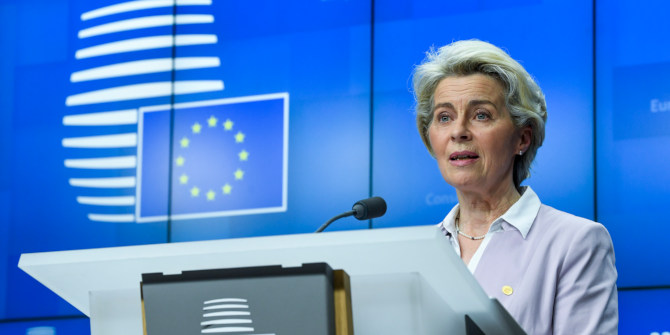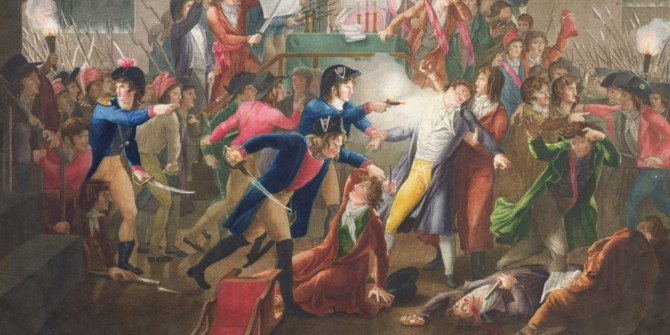What role does philosophy play in accounts of European history? Simon Glendinning writes that European history has never been an exclusively empirical question and has always also been philosophical. Even today, many of the key political differences over European integration remain inseparable from a contest over profoundly philosophical divergences concerning the meaning of ‘ever closer union’.
While the research of an empirical historian should be open to surprises and discoveries, writings on Europe’s empirical history actually display a remarkably, indeed overwhelmingly, invariable character, at least in their overall picture.
With respect to identifying something like a sequence of developments that have brought Europe to where it is today, there is, it seems, only one sequence to follow. This (the only) history of Europe runs: Greek-Roman-Christian-Modern. So tight is this link between a certain history and Europe’s contemporary condition one might wonder whether anything else could possibly be the history of what is called “Europe”. A different historical sequence would be the history of someplace else.
One thing is for sure: nothing could be more European than this representation of Europe’s history. Hence, even while the European historian of Europe Norman Davies will cite (his teacher) A.J.P. Taylor playfully declaring that (given the vagaries of Europe’s spatial limits) “European History is whatever the historian wants it to be” (p. 45), Davies does not blink when he affirms what most historians actually want it to be.
“Most historians”, he says, want European history to be “found” in “each of the great epochs of Europe’s past”, so that what has “always featured prominently” in such accounts is a story that takes “the roots of the Christian world” to lie in “Greece and Rome”, and “modern phenomena such as the Enlightenment, modernisation” to emerge out of that Christian world (p. 15). We are in a space where the most fundamental decisions on Europe’s history and identity have already been made, and actual relatings of the supposedly open and whatever-you-want-it-to-be empirical history of Europe are, in fact, invariably… the same.
Philosophical history
Although it may seem a somewhat shocking proposal, I believe this is because the history of Europe is not and has never been an exclusively empirical question. It has always also been philosophical, the subject of a philosophical history. What I mean is that the fundamental decisions that bear on the way Europe’s history has been understood are best conceived as philosophical decisions. This is because they imply decisions concerning the being of the entity that we human beings are, the entity that has, in Europe, called itself (in one or other language) “man”.
It is not just the name of “man” but a distinctive understanding of the meaning of that name. For us (Europeans), the conception of “man” at issue here has two basic sources: Greek philosophy and Biblical theology. The former defines the entity that we (human beings) are as, uniquely, the zōon logon echon – the living thing with the capacity for the logos. Logos was translated in the Latin of the Roman Republic as ratio. Today we say reason and often still conceive “man” as the rational animal.
The Biblical source defines the entity that we ourselves are in terms of the imago dei: “man” is the ens creatum, the created thing, that, uniquely, is created in God’s image or likeness. Together these two sources of our self-understanding define what is called “man” for us (Europeans), as theomorphic rational animality. And our (human) history is then understood as the unfolding self-realisation of that entity in time: the development of “man” towards his proper telos or eschaton that would realise a maximally rational form of individual and social life.
This is a teleo-eschatological conception of the development of the human being. With this conception providing the basic understanding of our own (human) being, we (Europeans) inhabit a spiritual or cultural world whose form is progress. It is a world structured by the idea of progress towards an “end of man”, and hence also the idea of empirical history as providing evidence for the general movement towards a form of individual and social life in which the full potential of “man” (thus defined) could be attained for all humanity.
Cosmopolitan ends
This is the understanding of empirical history as set into or unfolding inside universal history. This understanding is not founded on discoveries made by historical research but belongs to philosophy as the site for us (Europeans) of a decision regarding the meaning of our (human) being as “man”.
It is also an understanding of history in which the most “advanced” developments of human progress and emancipation (as conceived in terms of the self-realisation of “man” as theomorphic rational animality) are conceived as having arisen and taken shape first in Europe – which is to say in what is now given as the Greco-Romano-Christian developments that have brought Modern Europe into being as a new and advanced historical stage in the development of “man” as such.
Europe is at the head, but the history of “man”, universal or philosophical history, relates a movement towards an end (telos) that embraces all humanity – whether that final condition is understood to be lived-out in a still-nationally differentiated way or a fundamentally beyond-national undifferentiated way. In either case, “man” is conceived as that created creature with a historical nature in the strictest sense: “man”, the being that we human beings are, is the being whose own being unfolds in time in a movement from a primitive origin towards a properly civilised end – with we the Europeans at the front.
If we ask how this end is conceived, we once again find one decisive answer: the final end of history is peace, freedom and well-being for all humanity, a condition of humanity living harmoniously in what can be called a universal cosmopolitan existence, where, finally, every other is my fellow, and not just “my fellow Brits” or “my fellow Germans” or “my fellow Europeans”.
These fellows – all of them – are all, of course, human, and first of all human men (males): my fellow is, first of all, my brother. Hence, we might also speak of the epoch of this understanding of “man” and history as an epoch of anthropocentric and androcentric cosmopolitanism. And with Europe conceiving itself at the head of this universal history, it is also a Eurocentric cosmopolitanism.
This conception of “man” and history, and Europe’s place at the head of it, is not merely one conception among others in Europe’s history. Indeed, there is reason to consider it the European conception of history par excellence, the foundational cultural idea in the culture of Europe and its history. Here is the philosopher Jacques Derrida summarising the cosmopolitan tradition in a lecture given in English in 1997:
“[The] tradition of cosmopolitanism…comes to us from, on the one hand, Greek thought with the Stoics, who have a concept of the “citizen of the world”. [But] you also have [in] St. Paul, in the Christian tradition, a certain call for a citizen of the world as, precisely, a brother. St. Paul says that we are all brothers, that is sons of God, so we are not foreigners, we belong to the world as citizens of the world; and it is this tradition that we could follow up until Kant…”
We can indeed follow this up to Kant. Here it is, Kant’s extraordinary summary of the world-historical process towards the end that, as he sees, is underway, and most advanced, in Europe:
“The effects which an upheaval in any state [as a result of war with another state] produces upon all the others in our continent, where all are so closely linked by trade, are so perceptible that these other states are forced by their own insecurity to offer themselves as arbiters, albeit without legal authority, so that they indirectly prepare the way for a great political body of the future, without precedence in the past. Although this political body exists for the present only in the roughest of outlines, it nonetheless seems as if a feeling is beginning to stir in all its members, each of which has an interest in maintaining the whole. And this encourages the hope that, after many revolutions, the highest purpose of nature, a universal cosmopolitan existence, will at last be realized as the matrix within which all the original capacities of the human race may develop.” (Kant’s Political Writings, p. 51, my emphasis)
An extraordinary fact: as a first stage on the way to a condition of “a universal cosmopolitan existence” Kant predicted and projected the formation of… a European union.
We are used to thinking of European integration as a primarily post-War phenomenon, which, of course, in terms of empirical political history, it largely is. But how did it come about that, in this war-torn continent, the desire for “ever closer union among the peoples of Europe” started to make its way in a supranational institutional form?
With this question we are concerned, I believe, not only with empirical events (like the formation of the European Coal and Steel Community in 1951), but also with philosophical events (like the appearance of Kant’s text on universal history in 1785). The latter not only have a completely different historical temporality, but confer a telic sense, for us, on historical temporality itself (“ever closer”).
In other words, the specific post-War developments in Europe that are the theme of the empirical historian’s interest in the history of European integration themselves carry and sustain an implicit philosophical history through which and in terms of which the shape of Europe’s empirical history is understood as part of the history of “man” as such and the movement towards the cosmopolitan end.
The factual-empirical project of European integration carries that philosophical-telic sense that will make of the “political body without precedence in the past” which appears on the stage of history in post-War Europe, a fundamentally philosophical institution, its appearance in Europe’s empirical history also a philosophical event, fundamentally tied to the project of “ever closer union among the peoples of Europe”.
Ever closer union
Prior to the UK’s ‘Brexit’ referendum, the British Prime Minister David Cameron tried to renegotiate a “new settlement” on the UK’s membership, and very nearly won what might have been a significant change not just for the UK but for the EU. The draft agreement between Cameron and President of the European Council, Donald Tusk, presented on 2nd February 2016, included the following text under the heading “sovereignty”:
“References in the Treaties and their preambles to the process of creating an ever closer union among the peoples of Europe are primarily intended to signal that the Union’s aim is to promote trust and understanding among peoples living in open and democratic societies sharing a common heritage of universal values. They are not an equivalent to the objective of political integration.”
This text did not make it to the final agreement of 19th February 2016, the latter replacing it with the bizarre proposal that EU treaties be amended “so as to make it clear that the references to ever closer union do not apply to the United Kingdom”. The draft text may not have anyway given Cameron what he needed to win the referendum, perhaps nothing would have given him that, but its replacement (with its interestingly truncated quotation of the famous “ever closer” telic words), the strangest of all UK EU opt-outs, was an unconvincing variation.
In the end, the final agreement, with its truncated quotation and its accompanying (very) long explication that “references to ever closer union” in the EU treaties in fact already have no legal significance whatsoever whether they “apply” to a member state or do not, only served to confirm that these famous words were also jealously guarded words for those who wanted them, vaguely-if-not-legally, to still “signal” a vision of (“ever closer”) political integration, and not to be put on the books, as the draft would have had it, as something definitively and explicitly “not equivalent” to that.
While philosophy opens the space in which the thought of a cosmopolitan end in Europe makes its way in European history, philosophical contributions do not converge on just one model for such an end or indeed everywhere endorse the proposal that it requires the formation of a supranational political body. Within the invariable philosophical picture of universal history with a telic sense, there are serious variations concerning the ideal form of its final ending and the European form of its most advanced becoming, variations which still define our politics.
Even today, political differences are inseparable from a contest over profoundly philosophical divergences concerning the proper understanding of those famous telic words concerning Europe’s end. There are, I believe, just three basic variations here. In the movement of progress “ever closer” towards peace, freedom and well-being for all, we should, it will be supposed, strive politically for either: (a) plurality of “Free States” in Europe; or (b) a “European Superstate” (as one might put it in English), or a “European Federal State” (as one might put it in German), or a “Great European Republic” (as one might put it in French), all in all a movement towards “a kind of United States of Europe” (as Churchill put it); or (c) the unstable stability that would belong to what (200 years ago) Immanuel Kant had called “a Federation of Free States”, a set-up we might call “a United Europe of States”
Understanding why the third variation is overall the best is not just a matter of appreciating what has the best chance of practical success – but also of what makes most sense as belonging in the range of things one can possibly conceive of as European public policy “in the national interest”.
And, I submit, that does not include either (a) supposing it might be in the national interest for ones neighbours to be a permanent and standing threat or (b) supposing it might be in the national interest simply to give up having a national interest at all. Despite its precarious stability, option (c), what Kalypso Nicolaïdis has called “sailing on the Rubicon” (p. 14), still remains the best heading overall in Europe, there where it is in the national interest of each, as Kant put it, “in maintaining the whole”.
For more information, see the author’s accompanying two-volume book, Europe: A Philosophical History (Routledge, 2021). Volume 1 is available here and Volume 2 here.
Note: This article gives the views of the author, not the position of EUROPP – European Politics and Policy or the London School of Economics. Featured image credit: Daniel Seßler on Unsplash





